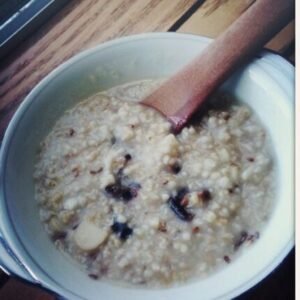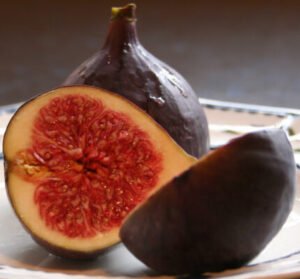Medically reviewed by Dr. Ramesh Gaddam, M.D. — Written by Sumalatha, D.N.H.E
1. Dry Figs (Anjeer) Nutrition
Nutritional breakdown for dried figs (per 100 grams)
| Nutrient | Amount per 100g |
|---|---|
| Calories | 249 kcal |
| Water | 16.26 g |
| Protein | 3.3 g |
| Carbohydrates | 63.87 g |
| Sugars | 47.92 g |
| Fiber | 9.8 g |
| Fat | 0.93 g |
| Saturated Fat | 0.253 g |
| Monounsaturated Fat | 0.144 g |
| Polyunsaturated Fat | 0.07 g |
| Omega-3 Fatty Acids | 0.09 g |
| Omega-6 Fatty Acids | 0.067 g |
| Vitamins and Minerals | |
| Vitamin A | 9 µg (1% DV) |
| Vitamin K | 4.7 µg (4% DV) |
| Vitamin B6 | 0.1 mg (6% DV) |
| Niacin (B3) | 0.4 mg (2% DV) |
| Riboflavin (B2) | 0.05 mg (4% DV) |
| Folate (B9) | 3 µg (1% DV) |
| Vitamin C | 1.2 mg (1% DV) |
| Vitamin E | 0.11 mg (1% DV) |
| Calcium | 162 mg (16% DV) |
| Iron | 2.03 mg (11% DV) |
| Magnesium | 68 mg (17% DV) |
| Phosphorus | 67 mg (10% DV) |
| Potassium | 680 mg (14% DV) |
| Sodium | 10 mg (0% DV) |
| Zinc | 0.55 mg (5% DV) |
| Copper | 0.25 mg (28% DV) |
| Manganese | 0.13 mg (6% DV) |
2. Dry Figs (Anjeer) Benefits
Rich in Nutrients:
Dry figs are a good source of essential nutrients, including dietary fiber, vitamins (such as vitamin A, vitamin K, and B vitamins), and minerals (such as potassium, magnesium, zinc, copper, manganese, and iron).
Digestive Health:
The dietary fiber in dry figs promotes healthy digestion and can help prevent constipation. Fiber adds bulk to the stool and facilitates regular bowel movements.
Weight Management:
The fiber content in figs can contribute to a feeling of fullness, which may help in controlling appetite and managing weight.
Heart Health:
Potassium, a mineral found in figs, is essential for maintaining heart health. It helps regulate blood pressure, reducing the risk of hypertension and cardiovascular diseases.
Antioxidant Properties:
Figs contain antioxidants, including phenols and flavonoids, which help combat oxidative stress in the body. Antioxidants play a role in protecting cells from damage caused by free radicals.
Blood Sugar Control:
Some studies suggest that figs may have a positive impact on blood sugar levels. The soluble fiber in figs can help regulate blood sugar by slowing down the digestion and absorption of sugars.
Bone Health:
Figs are a good source of calcium and phosphorus, both of which are important for maintaining strong and healthy bones.
Iron Absorption:
The presence of iron in figs can contribute to preventing iron deficiency anemia. Iron is essential for the transport of oxygen in the blood.
Skin Health:
Vitamins A and K, along with antioxidants, contribute to skin health. These nutrients help in maintaining healthy skin, promoting collagen production, and protecting against signs of aging.
Immune Support:
The combination of various vitamins and minerals in figs supports overall immune function, helping the body defend against infections and illnesses.
Alkalizing Properties:
Figs have alkalizing properties, which can help balance the body’s pH levels. Maintaining a balanced pH is important for overall health.
Pregnancy Support:
Figs contain nutrients like folate (vitamin B9), which is crucial during pregnancy for the development of the fetal neural tube.
5. Benefits of Dry Fig for Female
6. Benefits of Dry Fig for Pregnancy
7. Anjeer for Weight Loss
8. Anjeer for Diabetes
9. Dry Fig Benefits for Skin
10. Dry Fig (Anjeer) Benefits for Hair
9. Calories in Anjeer
The calorie content in anjeer, or dried figs, can vary depending on factors such as size and preparation.
- On average, dried figs contain about 249 calories per 100 grams.
10. Dry Fig Glycemic Index
- The glycemic index of dry figs (anjeer) is moderate, from 35 to 60.
- The index varies with ripeness and preparation.
- Figs have natural sugars but also fiber.
- Fiber slows sugar absorption and moderates blood sugar impact.
- Individual responses to food can differ.
- Overall meal composition affects glycemic response.
- Monitor carbohydrate intake and consult healthcare professionals for personalized advice.
11. Dry fig vs fresh fig
| Characteristic | Dry Figs | Fresh Figs |
|---|---|---|
| Water Content | Lower (dried) | Higher |
| Calories | Higher (concentrated) | Lower |
| Sugar Content | Higher (concentrated) | Lower |
| Fiber Content | Higher | Lower |
| Nutrient Concentration | Higher | Lower |
| Texture | Chewy and Denser | Soft and Juicy |
| Shelf Life | Longer | Shorter |
| Usage | Snacking, Baking, Cooking | Fresh Eating, Salads |
| Availability | Year-round | Seasonal |
| Natural Sweetness | Yes | Yes |
Frequently Asked Questions
What is Anjeer?
Anjeer, also known as figs, comes from the Ficus carica tree and can be eaten fresh or dried. Fresh figs are known for their sweet taste and chewy texture, while dried figs, or dry anjeer, have a more concentrated flavor.
How to Eat Anjeer?
You can enjoy fresh anjeer by washing and eating them directly. Dried figs can be consumed as a snack, added to recipes, or soaked beforehand to achieve a softer texture.
How to Eat Anjeer for Weight Loss?
Consume anjeer in moderation due to its calorie content. You can add it to salads, yogurt, or use it as a healthy snack. For a balanced snack, pair it with protein.
How to Eat Anjeer with Milk?
Soak anjeer in water until it becomes soft. You can then add the soaked anjeer to a glass of milk, blend it into a smoothie, or enjoy it as a bedtime snack.
How Many Anjeer to Eat Per Day?
A moderate serving is typically 2-3 dried figs a day, though this can be adjusted based on individual dietary needs and calorie goals.
How Anjeer is Made?
Dried figs are made by sun-drying fresh figs until they lose most of their moisture. This process concentrates their natural sugars.
How to Eat Anjeer During Pregnancy?
Consult with a healthcare professional before including anjeer in your diet during pregnancy. Enjoy it in moderation for its added nutrients and fiber, and soak it for easier digestion.
How to Eat Anjeer Fruit?
Wash fresh figs and eat them whole. For dried figs, soaking them enhances juiciness or you can simply enjoy them as a snack.
How to Eat Anjeer for Diabetes?
Consume anjeer in moderation. Pair it with protein or healthy fats to minimize blood sugar impact and monitor blood sugar levels regularly.
How Much Anjeer to Eat Daily?
Typically, 2-3 dried figs a day is recommended, but this can vary based on individual dietary needs.
How to Eat Dry Anjeer During Pregnancy?
Soak dry anjeer in water for a few hours before consuming. Enjoy in moderation to benefit from added nutrients.
How to Eat Anjeer Dry Fruit?
You can eat dry anjeer as a standalone snack. Soaking before eating can soften the texture.
How to Use Anjeer?
Snack on anjeer directly, add it to salads, oatmeal, or yogurt, or blend it into smoothies or desserts.
How to Eat Dry Anjeer?
Soak dry anjeer in water or milk until soft, then consume as a snack or add to recipes.
How to Eat Anjeer for Weight Gain?
Include anjeer in a balanced diet for extra calories. Combine with nuts, seeds, or nut butter for a calorie-dense snack.
Is Dry Fig Good for Babies?
Introduce solid foods cautiously to babies. Prepare anjeer by soaking or pureeing for easier consumption, and consult a pediatrician for guidance.
Eating Dry Fig on an Empty Stomach
Eating dry fig on an empty stomach can aid digestion due to its high fiber content. However, chew well or soak for easier digestion, and avoid large quantities to prevent discomfort.
Dry Fig or Fresh Fig: Which is Better?
Both have unique benefits. Fresh figs have more water content and vitamins, while dry figs offer concentrated sweetness and a longer shelf life.
Is Dry Fig Heat or Cold to the Body?
Traditionally, dry figs are considered “heaty” in some cultures, providing warmth, but responses can vary individually.
Is Dry Fig Good for Cough?
Dry figs contain antioxidants and soothing properties that may be beneficial. Consume as part of a balanced diet, but consult a medical professional for persistent cough issues.
Are Dried Figs Good for Skin?
Dried figs are rich in antioxidants, vitamins, and minerals, which can contribute to a radiant complexion and help combat oxidative stress.
Can We Eat Dry Figs Without Soaking?
Yes, dry figs can be eaten without soaking. However, soaking softens the texture and may enhance digestibility.
Who Should Not Eat Dried Figs?
Avoid dried figs if you have allergies to them or specific medical conditions; consult a healthcare professional if unsure.
What is the Best Time to Eat Dry Figs?
Dry figs can be consumed at any time. They make a great snack, can be added to breakfast, or enjoyed as a dessert.
How to Eat Figs for Best Results?
Enjoy figs in various ways: snack on them, add to salads, yogurt, or blend into smoothies. Pairing with protein or healthy fats can create a balanced snack.
What is the Difference Between Fig and Anjeer?
“Fig” and “Anjeer” refer to the same fruit. “Anjeer” is commonly used in South Asia.
Do Dry Figs Burn Belly Fat?
There is no direct evidence that figs alone burn belly fat. However, their high fiber content may contribute to a feeling of fullness, which can aid in weight management.
Can We Drink Water After Eating Soaked Figs?
Yes, drinking water after eating soaked figs is fine. It can aid digestion and support hydration.
Are Dried Figs Better than Fresh (Wet) Figs?
It depends on preference. Dried figs offer concentrated sweetness and a longer shelf life, while fresh figs have higher water content and are eaten as is.
How to Soften Hard Dried Figs?
Soften hard dried figs by soaking them in warm water for several hours or overnight, boiling them briefly, or microwaving with water in short intervals.
How Long to Rehydrate Dried Figs?
Soaking time for dried figs is typically several hours to overnight. They should be plump and soft when ready.
Is Anjeer Better Soaked or Dry?
This depends on personal preference and use. Soaked anjeer has a softer texture, while dry anjeer is chewier and suitable for snacking or recipes.
What Happens if We Eat Soaked Figs Daily?
Eating soaked figs daily can improve digestibility, increase hydration, and enhance nutrient absorption. However, since figs are calorie-dense, monitor overall intake, and individual responses may vary.
References:
[1] https://traya.health/blogs/hair-care/anjeer-benefits
[2] https://www.1mg.com/ayurveda/anjeer-218
[3] https://www.godigit.com/nutrition/anjeer-benefits
[4] https://amala.earth/blogs/amala-earth-blog/anjeer-benefits
[5] https://www.hexahealth.com/blog/anjeer-benefits
Also Read:
5 Potential Health benefits of Walnuts vs Pecans
Medically reviewed by Dr. Ramesh Gaddam, M.D.

General Physician, Diabetologist, and Critical Care Specialist.
Discover more from Health Build-Up
Subscribe to get the latest posts sent to your email.



